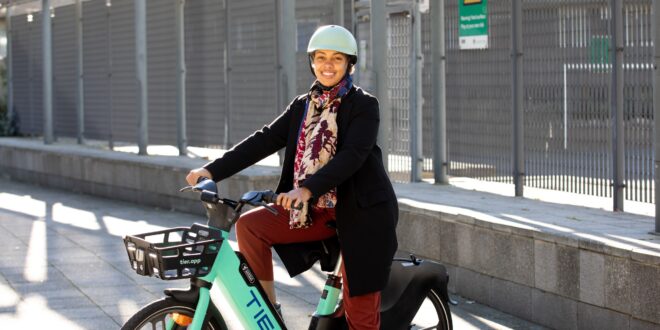Rebecca Morley speaks to Georgia Yexley, general manager of Tier Mobility, about the value diversity and inclusion bring to the cycling and micromobility industries
This piece first appeared in the April edition of BikeBiz magazine – get your free subscription here
As a fledgling sector micromobility is an industry that, at its core, must value inclusion and accessibility to be successful. Bringing people from multiple backgrounds, disciplines, experiences and expertise into the fold is the very essence of a new and sustainable form of transport – that is the sentiment expressed by Georgia Yexley, from the rapidly expanding micromobility firm Tier.
“There’s so much interplay between different industries and backgrounds that micromobility companies benefit hugely when we bring people from a broad range of backgrounds,” Tier Mobility’s general manager for the UK and Ireland Yexley told BikeBiz.
“If you build for a small group or for the minority, you’re not going to be successful in micromobility because you get that value when you are including more people, adding benefit to more people. That is not just in thinking about our users, but we’re also a business that occupies the public realm and is in the public domain.
“When you’re in the public domain, you have a responsibility for everybody and everything else that is there. If you only think about even the minority group of your users and people that sit or stand on your vehicles, you’re going to miss a really important side of how you actually deliver a successful business in micromobility, in not considering the many.”

Tier Mobility, founded in Berlin, Germany in 2018, is a shared micromobility provider that operates app-based e-scooter and e-bike rentals across Europe and the Middle East, including schemes in London and York in the UK.
Following a number of major investments through various funding rounds, Tier is now one of the fastest-growing players in the micromobility sector, most recently branching out into the US market after it acquired Spin, the shared transport operator previously owned by the Ford Motor Company.
There’s an intrinsic need in the organisation to bring people from cycling and active travel, continued Yexley, to bring their expertise but also pair that with an understanding of accessibility, inclusion, network, design, transport planning and app development.
“There’s so much at play in the micromobility space, which is what makes it really exciting because you’re working with people from all backgrounds all the time.”
Collaboration is key
So what can the bike trade learn from micromobility? Micromobility is a young industry, said Yexley, so it also has the benefit of learning from the industries that have gone before, and learning from existing research.
“I think it is a lot harder to look at something that has this long heritage of history and culture deeply entrenched in it and shake things up,” said Yexley. “It can be harder, but micromobility is a good example of the benefits of that. The industry has grown immensely in such a short period of time, there’s huge amounts of investment, but also companies that are publicly listed.
“There are profitable businesses in this, there are businesses that have gone through the roof just by virtue of the industry being born itself. If you look at the connected industries around lithium-ion batteries, and the continued use of those or recycling of those, there are so many offshoots of this industry that benefited because of this growth.
“The evidence is there that if you build in this way and you entrench these values at the outset, or if you’re a much more established organisation or industry, you do the work, assess where you might be missing some of that value, the benefits will come through, and there’s so much evidence to that factor. I think that is happening. There is absolutely phenomenal exchange happening across the micromobility and cycling industries, I think they are collaborating in a way that wasn’t happening a few years back.”
In the UK, Yexley said Tier has benefited from the experience and expertise of its partners from the cycling world, and an understanding of how to work with local authorities to deliver access, or how to engage with community or advocacy groups to make sure that it’s addressing concerns, and ensuring people can access its services.
“Micromobility is not only the teacher, but we learn a lot from the cycling industry and we can’t deliver the value of what we’re trying to deliver alone. We need to have a lot of collaboration with other people and experts to make it work. We’re growing so quickly, we’re so young that we do need to take the value of the people that have trodden that path before.”
The best thing we can do is give people choice, said Yexley, and allow them to choose the right tool for the job. “By giving somebody the option of a scooter or a shared e-bike, you’re not taking away their choice to have their own bike or get in the car because they need to ferry five kids and pick up all their shopping when they don’t have an e-cargo bike. Giving people the choice of sustainable transport is what we need to all rally behind.”
The cycling and micromobility industries want the same thing, Yexley continued – what benefits one benefits the other. “If somebody goes and buys a bike, they are much more likely to then interact with other forms of sustainable travel and vice versa. If somebody tries an e-bike for the first time in a shared scheme, they’re much more likely to go and think about the change that it makes to their lives, the mood improvement, health improvement, ease of travel, and maybe they’ll invest in one and buy one from the cycling industry.”
Delivering innovation
“This is by far the most diverse team I’ve ever had the joy to work with,” added Yexley. “What the Tier team in the UK is doing is evidencing some of that research around how much value diversity brings.
“We’ve grown so quickly. We’re delivering innovations that are to the benefit of the industry at large and that is born out, in every sense of the word, all backgrounds, nationalities, experiences, skillsets, working in a highly collaborative way.”
 BikeBiz Bicycle and cycling retail news
BikeBiz Bicycle and cycling retail news




